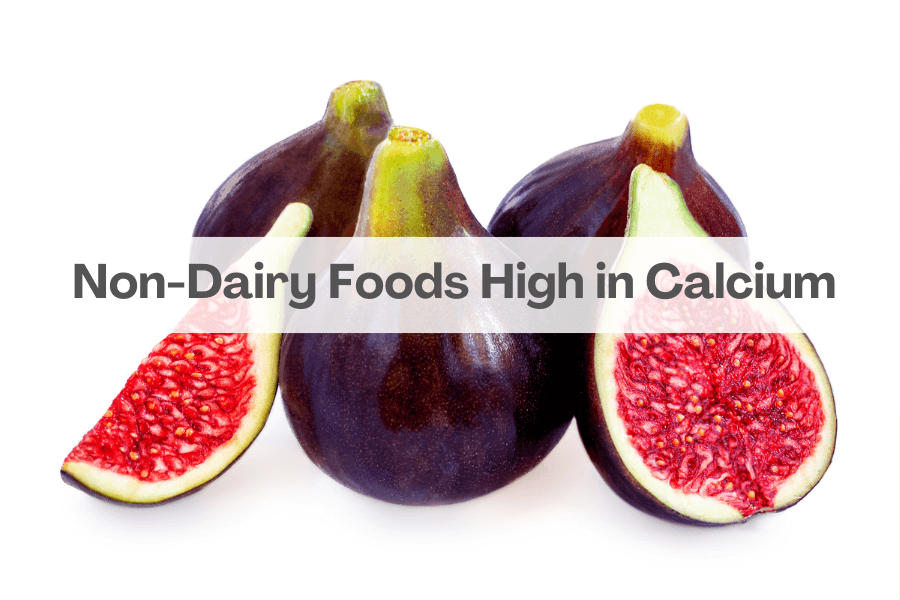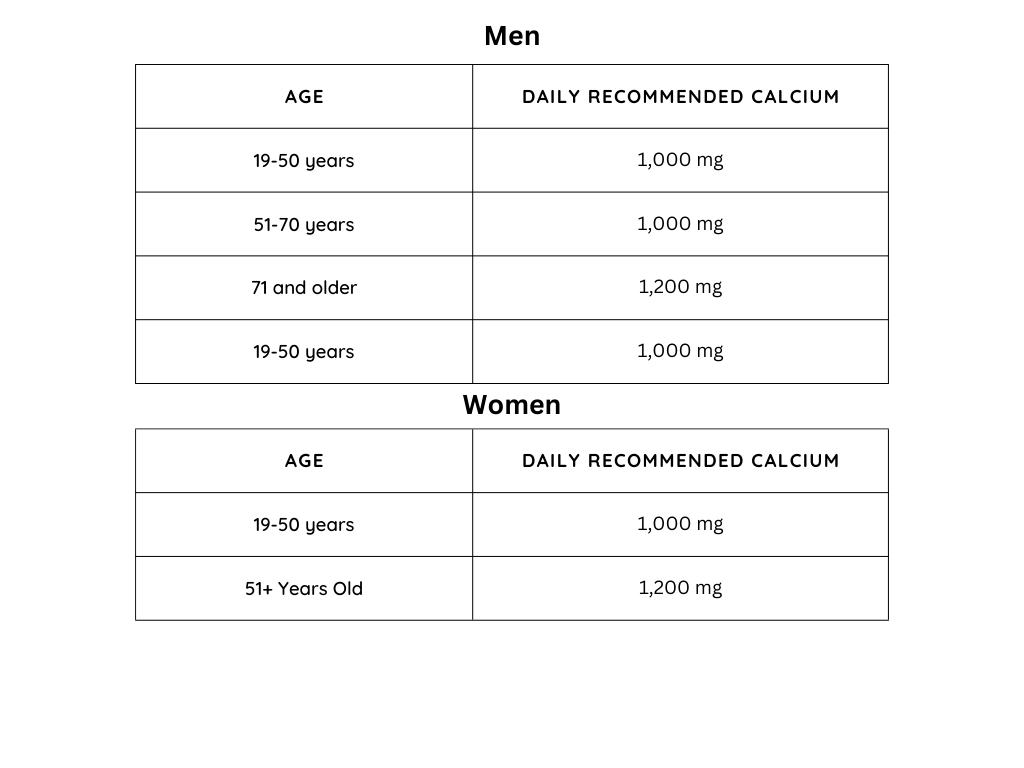If you are looking for plant-based, non-dairy foods that are high in calcium, then this blog post is for you! We can all agree that calcium is an essential nutrient for functioning properly and staying healthy. We also know that many people are either looking to reduce their consumption of dairy or eliminate it completely. This is a prime reason that SO many of us search for non-dairy food options that are high in calcium.
We can all agree that calcium is an essential nutrient for functioning properly and staying healthy. We also know that many people are either looking to reduce their consumption of dairy or eliminate it completely. This is a prime reason that SO many of us search for non-dairy food options that are high in calcium.
The good news is that there are plenty of delicious non-dairy food options out there that provide the same amount, or more, calcium than milk! In this article, we’ll be discussing 6 of the best non-dairy foods which offer a significant boost in both taste and nutrition value. So read on to learn more about non-dairy sources of calcium!
This blog post is all about Non-Dairy Foods that are High in Calcium.
What is Calcium?
Calcium is a mineral that is essential for multiple bodily functions, with the most well-known being maintaining healthy bones and teeth. However, calcium is also involved in blood clotting, nerve functions and regulating normal heart rhythms.
Almost all of the calcium in the body is stored in bones, while the remaining 1% is found in blood, muscle, and other tissues. This vital mineral can be obtained through a balanced diet that includes calcium-rich foods and supplements.
Failure to consume enough calcium can lead to several health issues. The removal of calcium from the bones is one such issue, and if not replaced, can have long-term consequences.
Therefore, it is REALLY important to understand the role calcium plays in the body and ensure that we are consuming enough to keep our bones and other vital organs healthy.
Benefits of Calcium
Calcium is an essential mineral that is necessary for maintaining good health. Our body needs it for various functions, from maintaining bone health to regulating muscle contractions.
1. Calcium Supports bone health
Calcium is critical for bone health. Our bones are developing from childhood through adulthood, and the intake of calcium is essential for their development. Moreover, adequate calcium intake is necessary to maintain peak bone mass in adulthood. If you don’t get enough calcium, your bones will become thinner, more brittle, and will be more prone to fractures and breaking.
2. Helps Regulate Muscle Contractions
Calcium helps regulate muscle contractions by interacting with magnesium. When nerves are stimulated by muscles, calcium is released. Calcium binds to proteins in muscles, generating a contraction. Magnesium blocks calcium to help muscles relax. When calcium is pumped out of the muscle, the muscle relaxes. We need calcium in our diet to keep our muscles functioning correctly and to prevent muscle pain or cramps.
3. Strengthens teeth
Calcium is essential for maintaining strong and healthy jawbones and teeth. It helps hold our teeth in place, and it works with phosphorus in childhood to develop the strength of our teeth. Calcium is also a part of tooth enamel, which helps protect our teeth from bacteria and tartar that leads to cavities and diminished oral health. Regular calcium intake can improve your dental health by protecting your teeth from decay and damage.
4. Balances pH levels
Calcium can also plays a crucial role in balancing pH levels in the body and helping to neutralize acidic compounds. When you consume acidic foods such as processed foods, sugary drinks, and cured meats, they can disrupt your body’s pH balance, hindering proper nutrient absorption and decreasing your overall health.
Therefore, consuming a sufficient amount of calcium can help maintain the right acid and alkaline balance in your body and keep you healthy.
Calcium and Vitamin D
Calcium and vitamin D both play crucial roles in maintaining overall health. It’s important to understand that your body needs adequate vitamin D in order to effectively process and absorb calcium. This means that even if you’re eating a diet rich in calcium, without sufficient vitamin D, you won’t fully reap the benefits that calcium has to offer.
Luckily, there are many sources of vitamin D available, including certain foods like salmon and egg yolks as well as products like milk that have vitamin D added.
Vitamin D can be found in certain foods such as fish oil and fortified dairy products, but it can also be obtained from exposure to sunlight. Sunshine is the best natural source of vitamin D as your skin produces it when exposed to sunlight.
Daily Calcium Requirement By Age
Calcium is an essential nutrient that everyone needs in order to maintain good health. As we age, our bodies require different amounts of calcium to function properly.
The following chart is the Daily Amount of Recommended Calcium according to the Mayo Clinic:
 Meeting your daily calcium requirement is important in so many ways. It prevents bone loss, maintains healthy teeth, and even reduces the risk of certain diseases such as osteoporosis.
Meeting your daily calcium requirement is important in so many ways. It prevents bone loss, maintains healthy teeth, and even reduces the risk of certain diseases such as osteoporosis.
It’s important to incorporate calcium-rich foods into your diet, or consider supplements to ensure you are getting the appropriate amount of calcium for your age.
Signs You Aren’t Getting Enough Calcium
Calcium is an essential nutrient that plays a crucial role in the growth and maintenance of healthy bones and teeth. A lack of calcium in your diet can lead to a variety of health problems.
If you are not getting enough calcium, you may experience the following symptoms:
- Muscle cramps
- Weakened bones and teeth
- Brittle nails
- Regular headaches
- Unexplained fatigue
It’s important to pay attention to these signs, as they could be a sign of a serious calcium deficiency. So, if you’re experiencing any of these symptoms, it may be time to take a closer look at your diet and make sure you are getting enough of this vital nutrient.
If you have ANY concerns at all, please consult your doctor or other health care professional (such as a functional doctor or even a nutritionist!)
Too Much Calcium Symptoms
On the flip side, getting too much calcium is also not beneficial to your health. Especially in the form of calcium supplements.
The symptoms of too much calcium can range from nausea, constipation, and kidney stones. The Mayo Clinic mentions that for adults between the ages of 19 and 50, the recommended upper limit for calcium intake is 2,500 mg a day. However, for those 51 years and older, this limit decreases to 2,000 mg a day.
Rather than relying on supplements, it may be better to prioritize calcium-rich foods in your diet and consult with a healthcare professional to determine an appropriate calcium intake for your individual needs.
6 Non-Dairy Foods That Are High in Calcium
When it comes to getting enough calcium in our diets, dairy products are usually the go-to. However, for those of us who don’t consume dairy, or are lactose intolerant, the question remains: where can we get our calcium fix?
Good news! There are still plenty of options! Non-dairy sources such as almond milk, leafy greens, figs, and fortified tofu can provide a variety of other important vitamins and minerals that dairy products may not offer.
Plus, opting for non-dairy sources of calcium can be a great way to reduce your environmental impact and support sustainable agriculture practices.
So whether you’re vegan, lactose intolerant, or simply looking for some new and healthy foods to add to your diet, exploring non-dairy sources of calcium is definitely worth considering.
1.Almond milk
While almonds themselves are a poor source of calcium, producers often fortify almond milk with this important nutrient. In fact, some brands of almond milk can contain up to 37% of your daily calcium needs in just one cup. This makes it an excellent option for those looking to up their calcium intake without consuming dairy products.
2. Leafy Greens
Leafy greens are known for their rich green color and nutrient density and are a powerhouse of vitamins and minerals that make them essential additions to any balanced diet.
One of the key nutrients found in leafy green veggies (such as kale or collard greens is calcium, an essential mineral for strong bones and teeth. And the best part? A single cup of cooked kale provides around 15-18% of an adult’s daily calcium requirement. This makes it a reliable and readily available source for those of us wanting to boost our bone health.
Plus, besides being high in calcium, leafy greens are also considered a Top Superfood and contain so many other vitamins and minerals such as iron, Vitamin A and Vitamin C.
3. Figs
When it comes to getting enough calcium in your diet, why not turn to the humble fig?
Sure, you might associate this fruit with being sticky and sweet. But, did you know that it’s also one of the best plant-based sources of this crucial mineral? That’s right, with just a handful of dried figs, you can get 5% of your daily recommended value of calcium.
Not to mention, these little powerhouses are also packed with fiber and antioxidants, which can help support a healthy heart and digestive system.
4. Soy Foods
There are many reasons why soy foods are a good source of calcium.
Let’s start with soybeans themselves: one cup of cooked soybeans provides almost 20% of your recommended daily intake (RDI) of calcium. And if you prefer edamame, you can get around 28% of your RDI in the same quantity.
But soy-based foods like tofu and tempeh also offer impressive amounts of this essential mineral. For example, a 3.5-ounce serving of tofu made with calcium phosphate contains 350mg of calcium. Tempeh and natto, which are made from fermented soybeans, both offer good amounts as well, with natto providing twice the RDI in just one serving.
5. Beans
Beans are known for their heart-healthy benefits, and they are also packed with calcium! This makes them a great addition to any diet.
Cannellini beans alone have 62 mg of calcium per 100 grams. Navy beans, pinto beans, and red kidney beans are also excellent options for those looking to boost their calcium intake.
6. Tofu
This versatile soy-based product is an excellent source of nutrition for vegans and non-vegans alike. One 3-ounce serving of tofu contains around 20% of your daily calcium needs. This makes it an excellent choice for those who want to support strong bones and teeth. And because tofu is so versatile, it can be used in a wide range of dishes (anywhere from stir-fries to soups to scrambled eggs!)
Whether you’re trying to boost your calcium intake or you’re just looking for a new protein source to add to your diet, tofu is definitely worth considering.
To sum things up, calcium is essential for optimal health and functioning, but luckily, plenty of delicious non-dairy sources high in calcium exist!
You don’t have to rely on dairy or risk sacrificing nutrition for taste. Whether it’s cooked kale with just a drizzle of olive oil or you want to get creative with milk made from almonds, there are so many great non-dairy food options that’ll satisfy your tastebuds and needs.
This list is meant to be used as a starter guide — experiment and find out which ones work best for you. Now that you know about the great variety in calcium-rich plant-based foods available to us, hopefully you’re inspired to take a swing at adding some of these non-dairy foods that are high in calcium to your daily mix!


